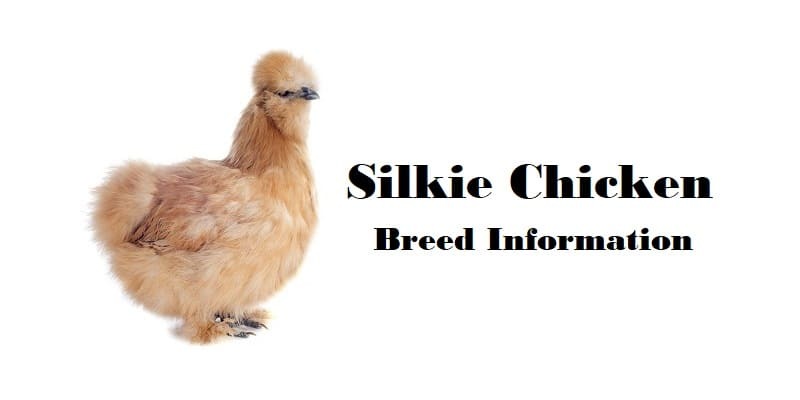Last Updated on January 14, 2025 by Pauline G. Carter
When one thinks of the Silkie Chickens, one thinks of soft silky, fluffy hair – its lovely plumage. That’s the Silkie, and with that, comes an equally lovely personality. No one is 100% about the Silkies’ origins, although it is believed they started somewhere in China or India; somewhere in Asia.
However, being so popular, they made their way to other countries too, such as Europe and North America. Now they are to be found all over the world. Another name for the bird is the Chinese Silk Chicken, which shows its Chinese origin.
However, nevertheless, the origin of the Silkie is not sufficiently ascertained. Marco Polo, the explorer commented about a “furry chicken” he had seen on his travels, and it is thought this was the Silkie.
Silkie Chicken | Breed Profile
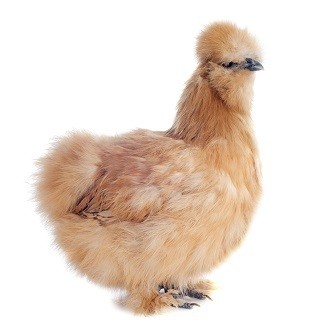
| Country of origin: | China |
| Primary use: | Eggs |
| Weight: | Male: 2-3 lbs. Female: 1.5-2 lbs. |
| Temperament: | Friendly, Calm |
| Recognized Varieties: | Blue, Black, Gray, White, Partridge, Splash, Buff |
| Egg production (annual): | 100 |
| Egg color: | Tinted, Cream |
| Egg size: | Small |
| Comb type: | Walnut |
Characteristics Of The Silkie Chicken
Silkies are unlike other chicken breeds in that their skin is a dark blue-black color. They also have good maternal instincts, willing to sit on other birds’ eggs, even turkeys. People say that the Silkie has like a UV-cone in their eyes, enabling them to see shades of color which helps them to be such good forages, and even to determine the health of their chicks!.
That is just another interesting observation about these unique birds! It has an interesting crest. This consists of a puff of feathers atop its head. Some of the Silkie breeds have a skull that arches upward, making the crest look more prominent.
Other chicken breeds also have crests. These include the Crevecoeur, the Sultan, Polish, and Houdan. In an attempt to increase the crest size of the Silkie, the birds have also been crossed with the Polish.
The Silkie chicken doesn’t fly well at all. They are not noisy either, being quiet in nature. They also have quite dense ‘under fluff’, and sometimes the tiny chicks get caught up in this which sometimes results in fatalities.
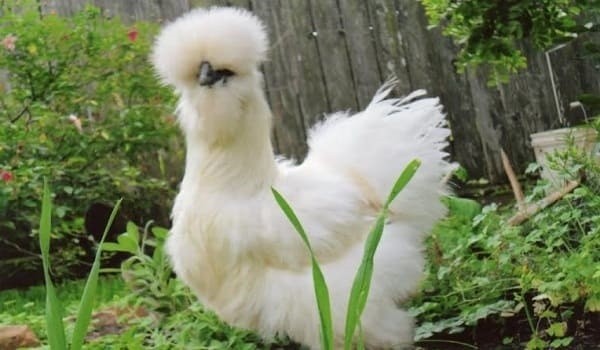
The Silkie has 5 toes compared to most other breeds which only have 4. You get the non-bearded variety and the bearded variety. Sometimes the feathering on a Silkie’s head is so profuse that it’s difficult to see its face. This feathering also extends down their legs.
The Silkie has turquoise earlobes that are oval-shaped with dark wattles; the beak is also grey-blue in color. The eyes are black. This bird’s feathers don’t hold together; the reason why it can’t fly. It also means the feathers aren’t waterproof, so when the bird is wet, it looks like it’s waterlogged.
Related Topic – 69 DIY Chicken Coop Plans and Ideas – Easy to Build (100% Free)
Colors of the Silkie are blue, black, white, buff, splash, partridge, gray, lavender, red, cuckoo and porcelain. Their eggs are creamy in color and the size of eggs are small-sized to medium-sized. They can lay anything between 100-120 eggs a year, but they can also stop laying eggs altogether during summertime.
The standard-sized Silkie weighs in at only 3-4 pounds. In the USA the Silkie is classified as a bantam breed, and these can weigh in only at around 18 ounces. Original Silkies were standard-sized, shown more in the UK.
Behavior / Temperament
Silkie chickens are sweet, charming chickens, calm and docile. They seem to enjoy plenty of attention and become rather tame.
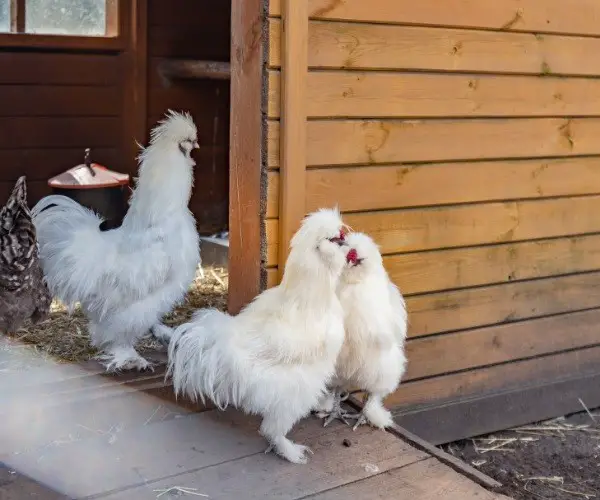
The pros and cons of the Silkie Chicken …
Pros
- Wonderful personality, not aggressive.
- Good foragers.
- They don’t mind smaller spaces.
- Good mothers.
Cons
- Because they are docile, they can get bullied by other chickens.
- Not suited to cold, wet conditions.
- Because of their small size and personality, they are better off not mixed with other chicken breeds – they tend to be bullied.
- Don’t get them if you want them for eggs or meat.
Related Topic – 15 Most Common Chicken Diseases, Symptoms and Treatment
Is The Silkie Chicken Right Choice For You?
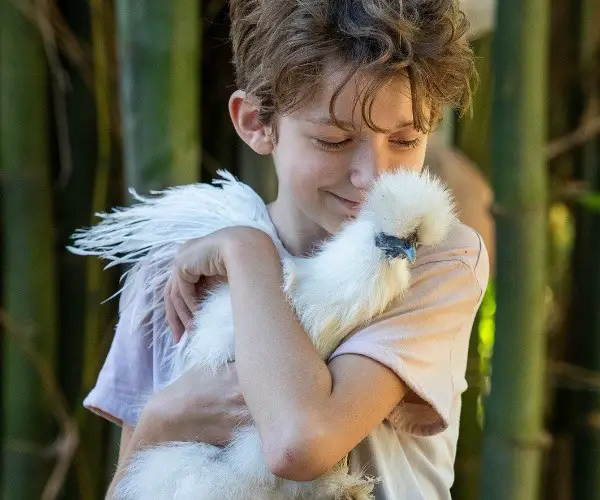
- Silkie chickens are bred more for ornamental purposes than for meat and egg-producing abilities.
- Many people want to keep them as pets because they have such sweet personalities and they look so striking and cute.
- The Silkie is a delicate bird to sex, and this is difficult to determine until they are around 6 months old already.
- They are also known to be susceptible to a disease called Marek’s Disease. It can affect all chicken breeds though. With their fluffy feathers, they can also be vulnerable to lice and mites so you need to pay attention to the health of these gorgeous birds.
- It might be necessary to trim their feathers around their eyes so that they can see a bit better as well. Silkies also need to be near fresh and clean water at all times because they can drink up to a half-liter of water; keep their water containers filled. The fluff around their tails also might need trimming for breeding and hygiene purposes.
- When looked after, and that also means keeping them clean and dry, they can live around 9 years old.
- Before you decide on buying Silkies, get acquainted with their characteristics and needs, so you know what to expect to avoid disappointment.
Ultimate Guide To Care For Silkie Chicken?
When it comes to taking care of Silkie chickens, there are some important things that you need to keep in mind. First of all, these chickens are very delicate and require a lot of care and attention. They are also very sensitive to changes in temperature and humidity, so you need to make sure that their environment is stable and consistent.
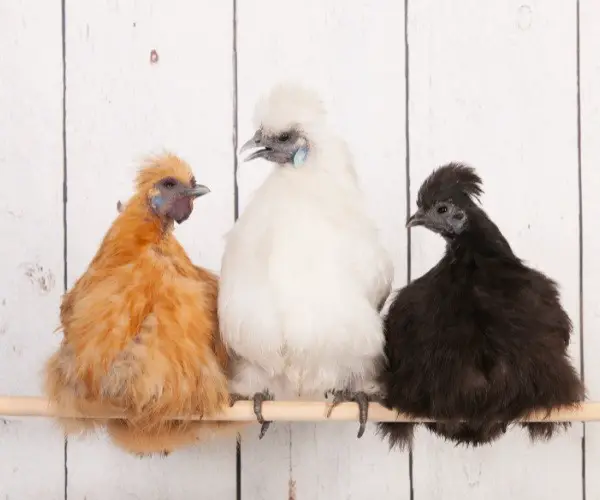
Here are some tips on how to take care of your Silkie chickens:
1. Provide them with a clean and spacious coop:
Silkie chickens are prone to respiratory problems, so it is important to provide them with a well-ventilated coop and plenty of space for them to move around. The coop should also be protected from the elements, such as wind, rain, and sun.
2. Give them a diet that is rich in protein:
Silkie chickens need a high protein diet to stay healthy and grow properly. You can either feed them commercially prepared chicken feed or give them a diet of cooked meals that contain chicken, fish, or meat.
3. Make sure they have access to clean water:
It is important to keep your Silkie chickens hydrated by providing them with clean water. You should also change the water regularly to prevent the water from becoming contaminated.
4. Keep their coop clean and free of debris:
A dirty coop can cause health problems for your Silkie chickens, so it is important to keep it clean. You should also remove any potential sources of food or water that may attract pests.
5. Check them for parasites and diseases regularly:
Silkie chickens are susceptible to various parasites and diseases, so it is important to check them regularly for any signs of illness. If you notice any problems, you should immediately take them to the vet.
By following these tips, you can ensure that your Silkie chickens will stay healthy and happy.
FAQ: Silkie Chicken
Are silkie chickens good for beginners?
Yes, silkie chickens are good for beginners because they are relatively easy to care for. However, it is still important to do your research before getting any chickens, as there are some things that you need to know to take care of them properly.
What do silkie chickens eat?
Silkie chickens need a high protein diet to stay healthy and grow properly. You can either feed them commercially prepared chicken feed or give them a diet of cooked meals that contain chicken, fish or meat.
How often should I clean the coop?
You should clean the coop at least once a week to remove dirt, debris or Droppings. However, you may need to clean it more often if it is particularly dirty or if there are a lot of chickens in the coop.
What are some common health problems with silkie chickens?
Silkie chickens are susceptible to various parasites and diseases, so it is important to check them regularly for any signs of illness. If you notice any problems, you should immediately take them to the vet.
Can I keep silkie chickens in my backyard?
You can keep silkie chickens in your backyard as long as you provide them with a clean and spacious coop. It is also important to make sure that the coop is protected from the elements and has plenty of space for the chickens to move around.
How cold can silkie chickens handle?
Silkie chickens are very sensitive to changes in temperature and humidity, so you need to make sure that their environment is stable and consistent. However, they can tolerate cold temperatures better than most chickens, so you don’t need to worry about them too much in winter.
Are All Silkies Bantams?
No, not all silkies are bantams. Bantam chickens are a specific breed of chicken that is smaller than most other breeds. Silkie chickens can be either standard or bantam-sized.
Do Silkie Chickens Smell?
No, silkie chickens do not smell any worse than other chickens. However, their feathers can be slightly oily, so you must bathe them more often than other chickens.
Final Verdict: Silkie Chicken
The Silkie chicken is a breed of chicken that originates from Asia. The Silkie chicken is characterized by its fluffy feathers, which are said to feel like silk. The breed is also known for its calm and docile personality. Silkie chickens are popular pets, and they are also used in some cultures for their meat and eggs.

